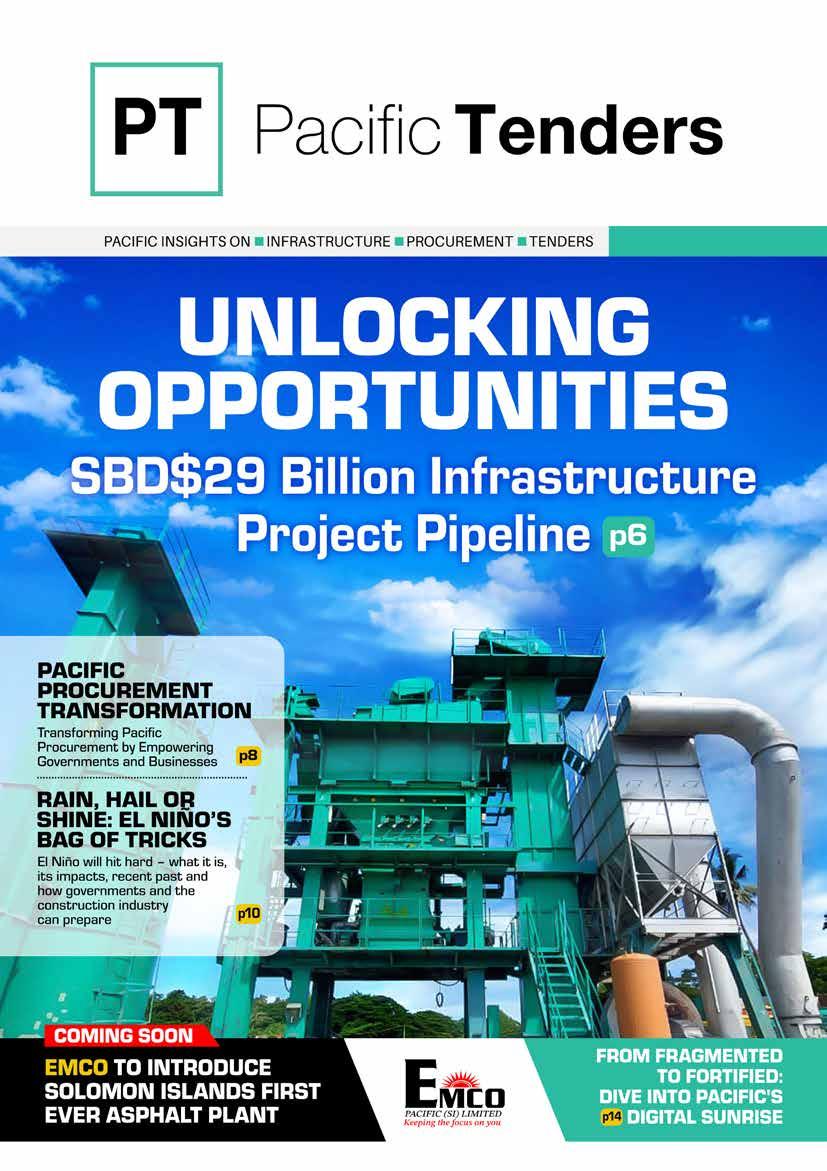
www.pacifictenders.com JANUARY - MARCH 2024 ISSUE 15

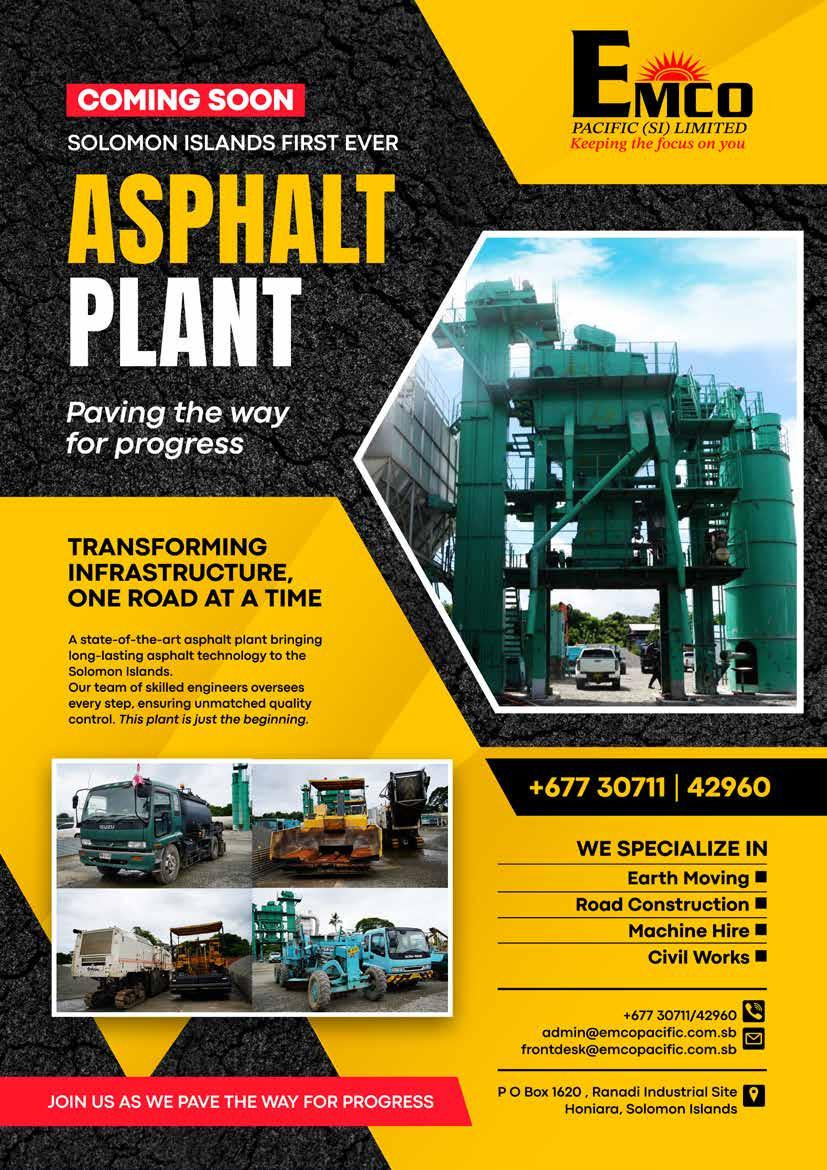


your next project here www.pacifictenders.com FIND
PT
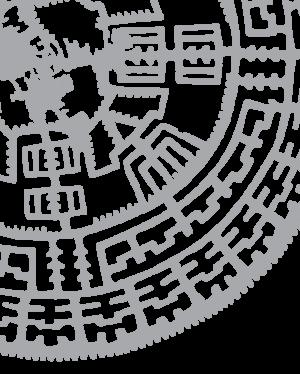
Published by Adkonect PNG PO Box 1954 Port Moresby, PNG www.adkonect.com.pg
Founder Publisher
Mr. Rodney Rupokets rodney@pacifictenders.com
Business and Marketing Director
Ms. Namoi Kaluae
Editor
Mr. Douglas Saefoa (Solomon Islands)
Contributing Writers
Mr. David Spring (Sydney, Australia)
PT Marketing and Research Consultant
Ms. Lorna Bondoc (Manila, Philippines)
Advertising Enquiries



contact@pacifictenders.com www.pacifictenders.com
S.I +677 38229
PNG +675 75971524
PNG +675 75923057
Editorial Enquiries
email: media@pacifictenders.com

Distribution
PT-Magazine is distributed via a Digital Copy accessed from the pacifictenders. com Platform reaching all PT Subscriber Companies and printed copies distributed to Government Agencies, Hotels, Retail and Hardware Supermarkets in Honiara and Port Moresby.
Relying on the support of our peers in the Construction and Infrastructure sectors to help this initiative grow.
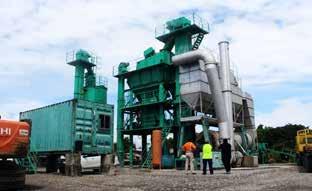
The
Pavement plant by EMCO Pacific (SI) Limited in the Solomon Islands marks a transformative moment for the nation's infrastructure development. The plant, obtained from Japanese contractor Kitano-WKK JV, promises to revolutionize road construction and maintenance in the country. Unlike conventional methods, asphalt offers a longer lifespan, up to 30 years, which addresses the persistent issue of deteriorating road conditions. EMCO's strategic move not only enhances competitiveness in bidding for contracts but also fosters inclusive growth by providing services to other local contractors. The meticulous operation of the asphalt plant, involving precise aggregate selection, heating, mixing, transportation, and placement, underscores the complexity of the process overseen by skilled engineers. With training initiatives underway to equip local talent with necessary skills, EMCO's initiative signifies a paradigm shift in the construction industry, poised to drive economic progress and improve citizens' quality of life in the Solomon Islands.
13 SALI TOWER GOES LIVE CONTENTS COVER STORY UNLOCKING OPPORTUNITIESSBD$29 BILLION INFRASTRUCTURE PROJECT PIPELINE 06 PT EDITORIAL NAVIGATING SOLOMON ISLANDS’ INFRASTRUCTURE EVOLUTION 21 PT MEET OUR MEMBERS 26 08 PACIFIC PROCUREMENT TRANSFORMATION 14 FROM FRAGMENTED TO FORTIFIED: DIVE INTO PACIFIC'S DIGITAL SUNRISE 16 GLOBAL CLIMATE FUND –PACIFIC PERFORMANCE 28 HGDC AND GENOFFGRID FORGE PARTNERSHIP TO ADVANCE REMOTE SOLAR POWER SOLUTIONS 29 USTDA ANNOUNCES NEW FUNDING FOR PACIFIC ISLANDS INFRASTRUCTURE DEVELOPMENT 18 MID UPDATES n Feasibility Study on Auki Road Tarsealing Project Successfully Concludes n Malaita Provincial Government Acknowledges China Harbour's Auki Road Study n Significant Progress in Malaita's Road and Bridge Upgrades Through SIRAP and SIRAP2 Projects 22 MHMS UPDATES
Construction Progresses on Solomon Islands' Comprehensive Medical Center
Renovation and Expansion of National Medical Stores Advancing Steadily n Tulagi Hospital Renovation project begins 10 RAIN, HAIL OR SHINE: EL NIÑO’S BAG OF TRICKS COMING SOON EMCO’S DREAM MANIFESTS
n
n
acquisition of an Asphalt
UNLOCKING OPPORTUNITIES

SBD$29 Billion Infrastructure Project Pipeline
THE SOLOMON ISLANDS National Infrastructure Priority Pipeline 2023 represents a monumental step forward in the nation's development trajectory. Consolidating crucial infrastructure projects and programs into a singular, cohesive document, this Pipeline charts the course for transformative change, shaping the future livelihoods of Solomon Islanders.
Aligned with the Solomon Islands National Development Strategy (NDS), and with the National Transport Core Initiative as its backbone, this Pipeline aims to redefine living standards by addressing unique challenges in each of the nine Provinces. Transport projects take precedence, recognizing their role as the backbone of development.
At its core, the Pipeline recognizes that transport and accessibility are the lifeblood of progress. Anchored in the National Transport Core Initiative (NTCI) policy, transport projects take center stage in the Pipeline's sequencing, laying the foundation for comprehensive development.
Each Province's analysis within the Pipeline offers invaluable insights into the challenges and opportunities at hand. With projects and programs methodically tabulated and mapped, stakeholders gain a nuanced understanding of the strategic rationale underpinning the Pipeline's architecture.
$29 Billion Infrastructure vision across 9 Provinces!
The Solomon Islands embarks on a transformative journey towards prosperity with the unveiling of its National Infrastructure Priority Pipeline for 2023 and over the next five to six years. This groundbreaking initiative presents a wealth of social infrastructure opportunities across all nine provinces, promising significant economic growth and development. Here's a glimpse into the priority projects earmarked for each province:
www.pacifictenders.com < JANUARY - MARCH / ISSUE 15 6
COVER STORY
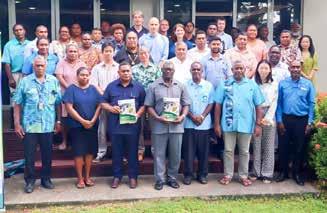
This comprehensive plan underscores the government's commitment to equitable development and lays the foundation for a prosperous future for all Solomon Islanders. By prioritizing critical infrastructure projects across the nation, the Solomon Islands charts a course towards inclusive growth and enhanced quality of life for its citizens.
INFRASTRUCTURE DEVELOPMENT / INDUSTRY > www.pacifictenders.com 7
Click to view the SINIPP2023 Document https://shorturl.at/beilU Economic Road Transport Maritime Transport Air Transport Energy Water & Sanitation ICT Solid Waste Productive Agriculture Commerce Tourism Fisheries Social Health Education 1 2 3 4 5 6 7 8 9 $2.16 BILLION $2.42 BILLION $10.59 BILLION $2.95 BILLION $2.02 BILLION $5.13 BILLION $1.86 BILLION $1.67 BILLION $3.05 BILLION 16 PROJECTS 17 PROJECTS 65 PROJECTS 22 PROJECTS 16 PROJECTS 46 PROJECTS 10 PROJECTS 12 PROJECTS 31 PROJECTS CENTRAL PROVINCE CHOISEUL PROVINCE GUADALCANAL PROVINCE ISABEL PROVINCE MAKIRA/ULAWA PROVINCE MALAITA PROVINCE RENNEL/BELLONA PROVINCE TEMOTU PROVINCE WESTERN PROVINCE Economic Productive Social $2.04B $122M $518M Economic Productive Social $2.1B $14M $300M Economic Productive Social $2.8B $121M $106M Economic Productive Social $1.6B $126M $257M Economic Productive Social $1.6B $107M $257M Economic Productive Social $1.75B$127M Economic Productive Social $1.5B$127M Economic Productive Social >> $9.6B $286M $2.3B Economic Productive Social >> $4.5B $357M $298M
Caretaker Prime Minister Manasseh Sogavare (front row, centre) at the launch of the National Infrastructure Priority Pipeline for 2023.
PACIFIC PROCUREMENT TRANSFORMATION
Transforming Pacific Procurement by Empowering Governments and Businesses
By LORNA BONDOC PT Marketing and Research Consultant Manila, Philippines
IN THE PACIFIC REGION , efficient, transparent, and accessible procurement practices are fundamental to economic prosperity. PacificTenders.com emerges as a revolutionary platform, tailored to address these specific needs. This article delves into its transformative impact on both the government and private sectors, highlighting its crucial role in the 2023 Pacific Games and the vast opportunities it unlocks for businesses.
Government Streamlining Efficiency and Bolstering Transparency
For government agencies, PacificTenders.com delivers a paradigm shift. Online bid submissions, real-time updates, and secure document exchange significantly streamline processes, reducing administrative burdens. This translates to tangible benefits: enhanced efficiency frees up valuable resources, enabling governments to stretch budgets further and deliver more for their citizens.
Beyond mere efficiency, PacificTenders.com champions transparency. Its open and competitive bidding process fosters trust and accountability, ensuring every dollar spent achieves maximum value. This aligns perfectly with the crucial demands of public procurement, building public confidence and strengthening governance.
Pacific Games 2023
A Showcase of Real-World Impact
The prestigious Pacific Games 2023 serve as a powerful testament to PacificTenders.com's impact. Chosen as the official platform, it facilitates strategic sourcing for materials, services, and infrastructure, ensuring a smooth and transparent procurement process. But its impact extends beyond logistics. PacificTenders.com promotes supplier diversity, empowering local businesses to actively participate in the games, nurturing economic growth and fostering community development, leaving a lasting positive legacy.
Private Sector Opens Untapped Potential
PacificTenders.com isn't solely for governments. Businesses, from established players to agile startups, can leverage this platform to unlock a wealth of opportunities. Imagine discovering lucrative government contracts perfectly aligned with your expertise.
The platform acts as a bridge, connecting you with projects that expand your market reach and contribute to regional development.
Visibility is key in today's competitive market. PacificTenders. com provides a platform to showcase your offerings to a vast and engaged audience of potential buyers. This fosters valuable connections, leading to new partnerships and propelling business growth.
For those with unique products or services, the platform offers a valuable tool: specialized tenders. These cater to specific needs, allowing you to target your business development efforts with laser focus, maximizing your chances of success.
The Future is Bright Embracing the Procurement Revolution
PacificTenders.com transcends the role of a mere platform; it's a transformative force shaping the future of Pacific procurement. Its continuous evolution promises a lasting and far-reaching impact. For governments, it represents an avenue towards increased efficiency, transparency, and cost savings, ultimately enabling them to deliver more for their citizens.
For businesses, it's a gateway to new opportunities, expanded markets, and a chance to contribute to the region's economic growth. Join the revolution. Embrace the power of PacificTenders.com and unlock the potential of a streamlined, transparent, and accessible procurement landscape in the Pacific. The future is bright, and it's powered by innovation and collaboration.
< JANUARY - MARCH / ISSUE 15 8
www.pacifictenders.com
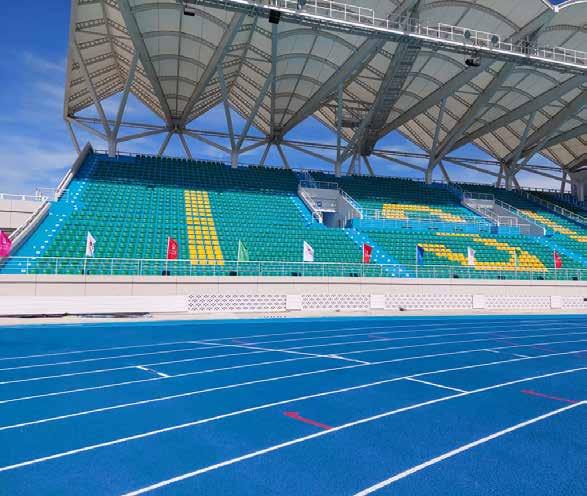
The prestigious Pacific Games 2023 serve as a powerful testament to PacificTenders. com's impact.
Chosen as the official platform, it facilitates strategic sourcing for materials, services, and infrastructure, ensuring a smooth and transparent procurement process.
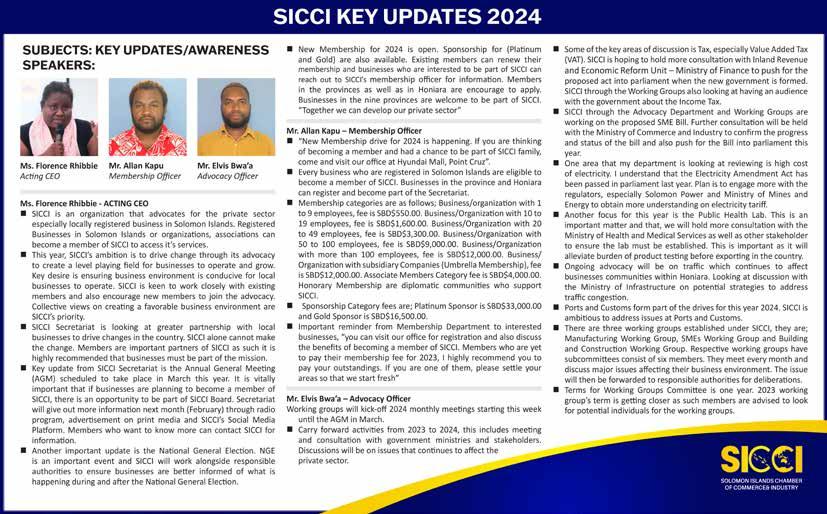
INFRASTRUCTURE DEVELOPMENT / INDUSTRY
RAIN, HAIL OR SHINE:
EL NIÑO’S BAG OF TRICKS
El
Niño
will hit hard – what it is, its impacts, recent past and how governments and the construction industry can prepare
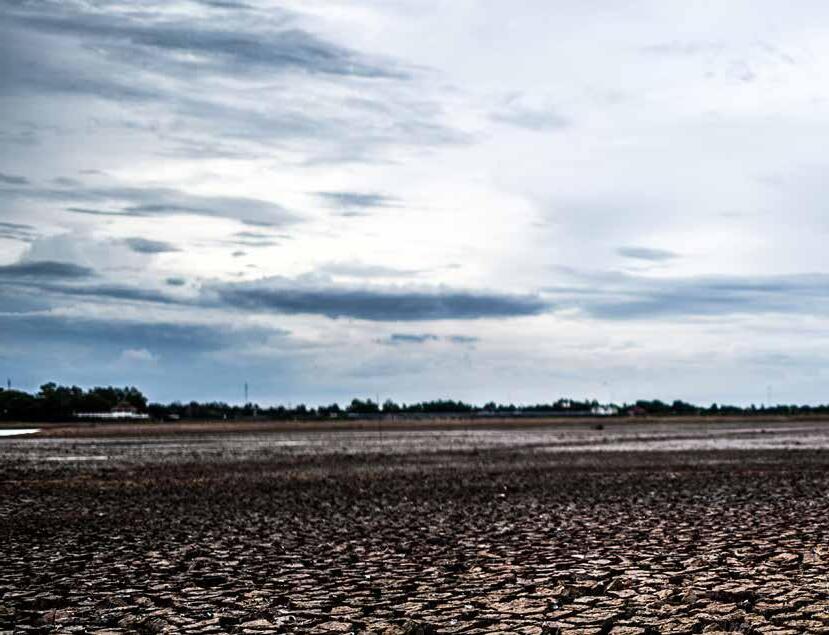
 By DAVID SPRING PT COLUMNIST Sydney, Australia
By DAVID SPRING PT COLUMNIST Sydney, Australia
BACK IN 1997, when the Southern Oscillation Index emerged into popular lexicon, a drought hit the Pacific. The drought effected a vast area of the Pacific, from Marshall Islands and Papua New Guinea, through Vanuatu, Fiji and Tonga to Samoa.
The effects of the drought were severe on livelihoods and economies, highlighting the Pacific’s sensitivity to climate fluctuation. A weather pattern called El Niño, one of the two patterns in the Southern Oscillation, was fixed over the western Pacific with little respite, from 1991 to 1998, causing rainfall to become far less frequent.
Finding Niño
El Niño’s opposite weather pattern is La Niña. When it’s La Niña in the east, it’s El Niño in the west, and vice-versa. The two oscillate across the Pacific Ocean, east to west, on a timescale of months to years. But which is which and what actually causes the droughts?
La Niña is caused by warmer than normal sea surface temperatures in the western Pacific. This warmer ocean generates higher
evaporation, more clouds and therefore more rainfall.
El Niño is the opposite – “cooler than normal sea surface temperatures in the western Pacific, and to the north of Australia. …El Niño events are associated with an increased probability of drier conditions… Decreased convection or cloudiness over tropical Australia, Papua New-Guinea, and Indonesia.
Niño Less Veges
An El Niño drought will impact many fundamentals that Pacific people rely upon for daily living and business operationsrainwater harvesting, crop growth, fruit trees, stream flow, freshwater fishing and increased fire risk.
Even yams and taro die during droughts. These are a key food source at all times, but especially after cyclones, as they are below ground and protected from damage. Even breadfruit and bananas died in Marshall Islands’ 2015-16 drought.
Prolonged lack of rainfall contributed to the growth of an invasive seaweed species in Funafuti, Tuvalu in 2011, greatly affecting food sources.
www.pacifictenders.com < JANUARY - MARCH / ISSUE 15 10
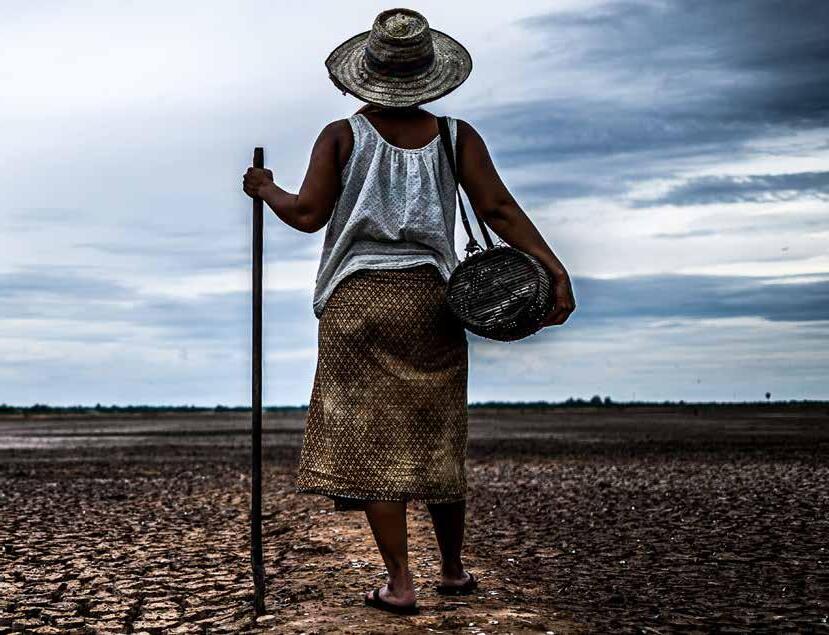
Hungry and thirsty, but construction?
While less papaya may not seem like a big deal to the construction industry, less available food affects the productivity of human capital. Construction in Pacific Islands is no different to most other places in the world – it relies on human capital – the energy and effort of human beings. If the population is not eating well because of food scarcity, or are walking long distances to collect water or wash, or they lack of drinking water during the day, they cannot work as hard or for as long. Productivity will be affected.
The stress of drought often affects the health and wellbeing of workers, their families and communities. For some workers, stresses can become chronic if mitigations and planning around drought impacts do not work out.
If drinking water is becoming scarce, no one wants to see it ‘wasted’ on construction works – road construction or concrete production. This can affect construction firms’ social licence to operate, especially in communities away from major centres.
There is precedent for drought being treated as Force Majure under construction contracts. This may reduce the risk of liquidated damages if the drought induces delays. But it may not be enough to save the business if its work force is either too preoccupied or too socially anxious to work.
La Respoñse
What can governments do to help the construction industry prepare and manage drought? Many things. Though resources are scarce to deliver some of these programs, governments need to recognise the centrality of the industry to the broader economy. Doing so will instigate the inclusion of some of the below initiatives in infrastructure programs.
Once a drought is on, it can be too late to mitigate impacts, we must be prepared in advance. Governments can:
n Assisting firms with risk management practices, providing training on building capability, depth and resilience
n Improve long range weather forecasting and dissemination of this information
Firms can:
n Understand and implement drought-resilient construction practices, such as alternatives to water for pavement layer compaction
n Consider a food support program to ensure workers and families maintain a minimum calorie in-take
There are many more. Informed businesses will be investigating and investing in these as business continuity measures. These can also double as low-carbon approaches. As the climate changes, so too must firms who want to survive the next Southern Oscillation.
INFRASTRUCTURE DEVELOPMENT / INDUSTRY > www.pacifictenders.com 11

SALI TOWER GOES LIVE
PT Media
The Solomon Islands Government in collaboration with Solomon Telecommunication Company Limited (STCL), together with the People's Republic of China, celebrated a significant milestone with the inauguration of the first mobile tower at Sali village in central Guadalcanal under the Solomon Islands National Broadband Investment Project (SINBIP). This “first go live” event marks a pivotal moment in the advancement of telecommunications infrastructure within the nation.
Speaking during the first go live event, said the SINBIP project is expected to increase network coverage to another two hundred thousand people nationwide. He added that the completion of the project, it is expected that 80 percent of the population will access 3G and 4G network and broadband internet services.
The Caretaker Prime Minister stated that SINBID’s objectives are to; improve the mobile network coverage and information development, improve telecommunications network infrastructure and promote national economic and social developments, and narrow the digital divide and implement UN 2030 Sustainable Development Goals.
The Ambassador of the Peoples Republic of China to Solomon Islands H.E. Mr. Cai Weiming, on the other hand, underscored the role of telecommunication industries in fostering economic growth, highlighting the Sali tower as the premier structure connecting to the Solomon Telekom network. This tower is the precursor to a network of similar structures set to improve connectivity across the Solomon Islands.
Dentana McKinnie Chairman of the Solomon Tower Limited and Acting Permanent Secretary to the Ministry of Communication and Aviation, acknowledged the challenges encountered during the initial phases but expressed optimism about overcoming them through collaborative efforts with key partners. McKinnie announced the full operational status of the Solomon tower and outlined plans for the expansion of the network. The first broadband tower at Sali is the first of 46 towers to be erected in the first phase of the project spanning Guadalcanal, Isabel and Central Islands provinces. PS Mckinnie revealed that since going live and operational on 20th March 2024 up until the launch on the 22nd, 5420 calls were made through the tower and 70 gigabytes of data was used over that short period. This is a positive indication that the Project is expected to not only increase coverage but also produce revenue.
In terms of funding, the statement confirms that the SINBIP will be fully funded with a 20 years’ term concessional loan of approximately CNY448.9 million from the Exim Bank of China at one percent (1.0%) interest rate. Despite the substantial investment, Caretaker Prime Minister Sogovare emphasized the importance of adhering to proper procedures and engaging with landowners to ensure the project's success. Recognizing the transformative potential of improved telecommunications access, the PRC Ambassador emphasized the importance of enhancing network quality, particularly for students and teachers in remote areas. Plans are underway to provide access to educational resources, online courses, and opportunities for business development, thereby fostering social and economic growth.
The inauguration of the first mobile tower symbolizes the beginning of a new era in telecommunications for the
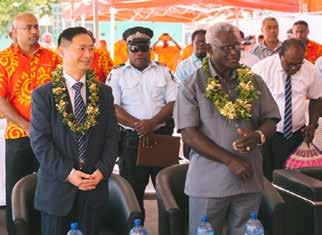
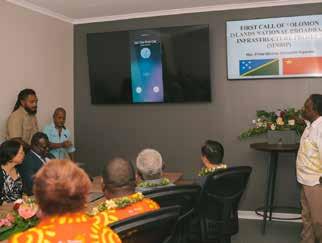
Solomon Islands. STCL Deputy Chairman Riley Maesepitu affirmed, this milestone represents a journey marked by both challenges and opportunities, with continued dedication required to realize the full potential of telecommunications infrastructure.
Looking ahead, the government and its partners remain committed to further projects aimed at enhancing the quality of life and promoting socio-economic development throughout the Solomon Islands. By prioritizing connectivity and innovation, they aspire to create a brighter future for all Solomon Islanders, especially those in underserved communities.
The Solomon Islands National Broadband Infrastructure Project (SINBIP) begins its rollout from Guadalcanal to Central and Isabel Provinces. China Habour Engineering Company has been contracted to erect the towers throughout the country while Telecommunications giant Huawei is providing telecommunications equipment and support to the project.
Caretaker Prime Minister Manasseh Sogavare and the Ambassador of the Peoples Republic of China to Solomon Islands H.E. Mr. Cai Weimin.
INFRASTRUCTURE DEVELOPMENT / INDUSTRY > www.pacifictenders.com 13
Caretaker Prime Minister Manasseh Sogavare making the first call to Sali tower in central Guadalcanal.
FROM FRAGMENTED TO FORTIFIED: DIVE INTO PACIFIC'S DIGITAL SUNRISE
 By LORNA BONDOC PT Marketing and Research Consultant Manila, Philippines
By LORNA BONDOC PT Marketing and Research Consultant Manila, Philippines
THE EXPANSE of the Pacific Ocean holds a tapestry of island nations, each with its own vibrant culture and unique challenges. While their beauty is undeniable, their inherent fragmentation presents formidable hurdles to economic and social development. Isolation, limited infrastructure, and vulnerability to external disruptions often act as shackles, hindering progress and prosperity. However, amidst these challenges lies an opportunity – a chance to rewrite the narrative through strategic technology adoption and the creation of a collaborative digital archipelago.
Imagine a future where:
Micro, small, and medium enterprises (MSMEs) across the Pacific seamlessly export their unique products to the world through robust e-commerce platforms, bypassing traditional hurdles and maximizing profit margins. Imagine bustling online marketplaces showcasing exquisite handicrafts from Solomon Islands, fresh produce from Vanuatu, and organic coffee beans from Papua New Guinea, all readily accessible to global consumers.
Governments leverage the power of data analytics to optimize resource allocation, proactively mitigate climate risks, and deliver targeted interventions to remote communities. Imagine healthcare professionals in Fiji utilizing telemedicine platforms to provide life-saving consultations to islanders in remote atolls, or environmental authorities in Samoa using real-time data to predict and respond to natural disasters with greater efficiency.
Logistics providers utilize blockchain technology for transparent and efficient tracking of goods across the intricate island chains, boosting trade efficiency and reducing costs. Imagine fresh fish caught in Kiribati being tracked and transported seamlessly to
markets in Australia, or medical supplies reaching remote villages in Tuvalu with minimal delays and logistical headaches.
These are just glimpses of the transformative potential technology holds for the Pacific. Its impact transcends sectors, fostering improved healthcare delivery, enhanced financial inclusion, and empowered governance. From boosting tourism and fisheries to facilitating education and renewable energy solutions, the digital revolution offers a pathway towards a brighter, more prosperous future for the Pacific island nations.
But the journey is not without its roadblocks. Several key challenges hinder the widespread adoption of technological solutions:
Infrastructure Constraints:
The vastness of the Pacific Ocean translates into inherent challenges with internet connectivity and reliable electricity. Patchy access to these vital resources acts as a significant barrier, stifling innovation and hindering online businesses. Imagine MSMEs struggling to upload product listings due to slow internet speeds or grappling with logistics management due to power outages.
Talent Gap:
A lack of skilled personnel trained in digital technologies impedes effective implementation and utilization of solutions. Without local expertise, even the most sophisticated platforms risk becoming underutilized or even unusable. Imagine government initiatives struggling to find qualified personnel to manage complex data analytics tools, or businesses lacking the technical know-how to maintain their online presence.
Financial Hurdles:
The high cost of technology and limited access to funding pose
www.pacifictenders.com < JANUARY - MARCH / ISSUE 15 14
challenges for both businesses and governments. This creates a vicious cycle, where limited resources hinder technology adoption, further hampering economic growth. Imagine small businesses in the Cook Islands struggling to secure funding for essential software, or governments in Palau facing budgetary constraints that limit their ability to invest in crucial infrastructure upgrades.
Cybersecurity Concerns:
Data security and privacy issues are paramount in the digital age. Without robust cybersecurity frameworks, businesses and governments hesitate to embrace digital solutions, fearing data breaches and reputational damage. Imagine communities in Tokelau hesitant to engage in online banking due to security concerns, or tourism operators in Tonga reluctant to adopt online booking systems due to data privacy fears.
Beyond Technology, Towards Empowerment
Overcoming these barriers requires a collaborative effort from various stakeholders:
Governments:
Prioritize strategic investments in infrastructure development: submarine cables, renewable energy solutions, and rural
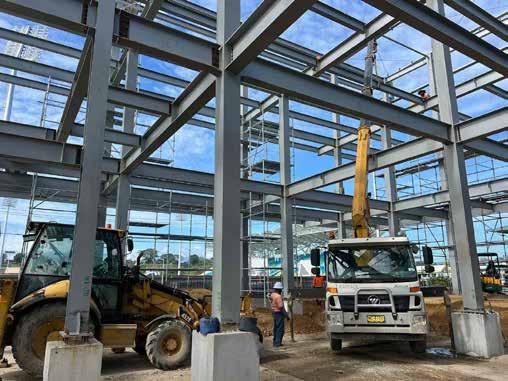
Development Partners:
Provide targeted funding and technical assistance tailored to the Pacific's unique context. This could involve supporting local tech startups, developing open-source platforms, and facilitating knowledge-sharing initiatives between developed and developing nations.
Private Sector:
Invest in innovative, context-specific solutions that address the specific needs of Pacific businesses and communities. Partner with local stakeholders to develop culturally relevant platforms and services. Prioritize local capacity building through training programs and partnerships to create a sustainable technological ecosystem.
Embrace the Digital Revolution, or Risk Isolation
The digital revolution is not just about technology; it's about empowerment. By strategically embracing technological advancements, Pacific nations can overcome historical limitations, forge deeper connections with the global community, and chart their own course towards a prosperous and sustainable future.
The time for action is now. We must collectively bridge the
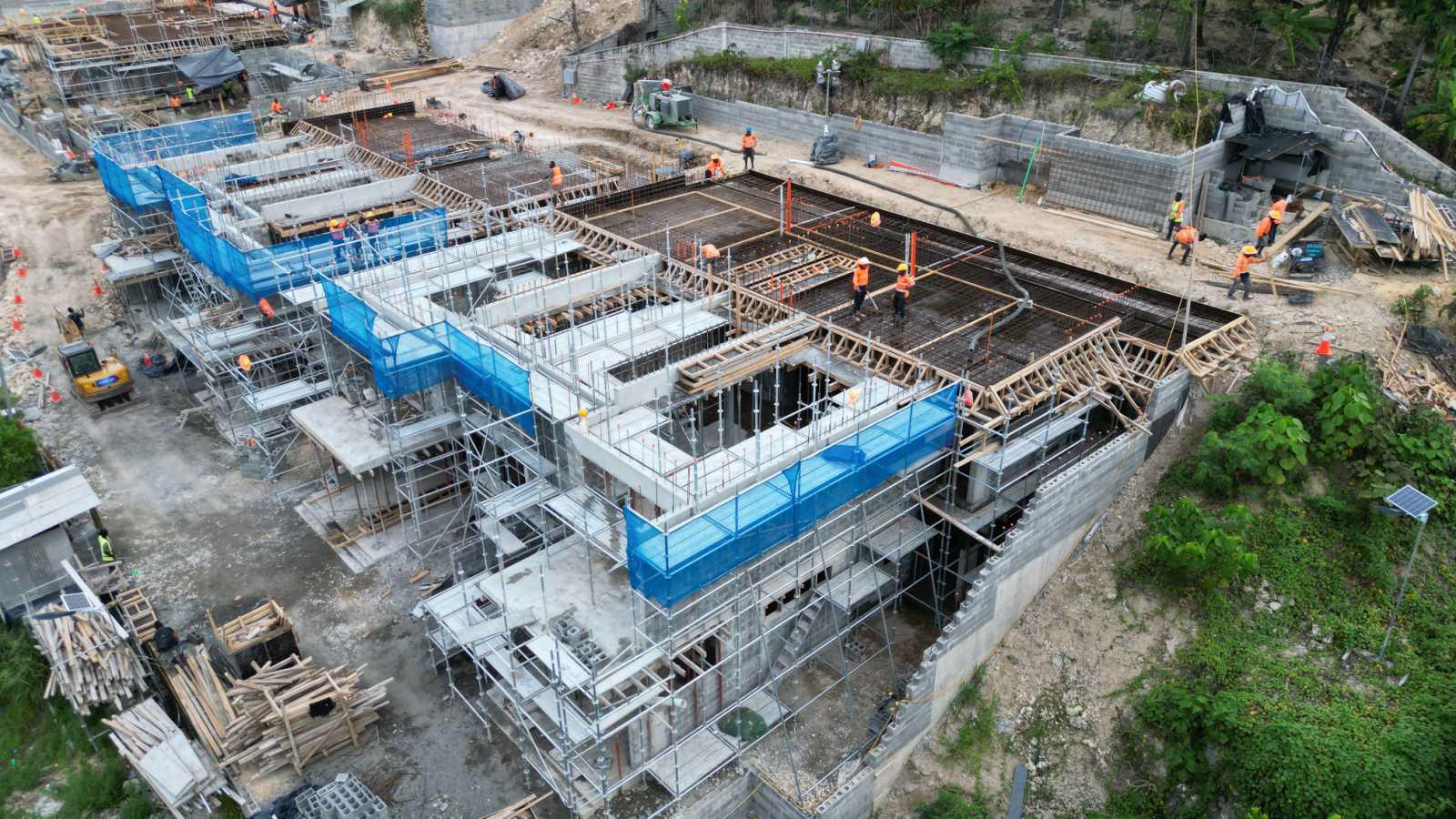
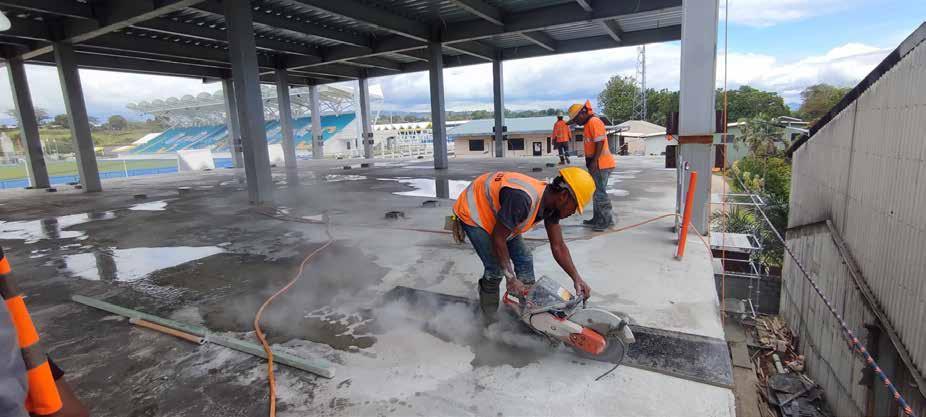
INFRASTRUCTURE DEVELOPMENT / INDUSTRY CIVIL, CONSTRUCTION & LOGISTICS Kukum Highway, Honiara, Solomon Islands www.hatanga.com 30401 contact@hatanga.com
GLOBAL CLIMATE FUND –PACIFIC PERFORMANCE
 By DAVID SPRING PT COLUMNIST Sydney, Australia
By DAVID SPRING PT COLUMNIST Sydney, Australia
THE GLOBAL Climate Fund (GCF), the world’s largest climatededicated multilateral fund, is at the centre of efforts to help developing countries adapt to climate change. Its aspiration is to increase total funds to $50bn by 2030. As the financing mechanism for the UN Framework Agreement on Climate Change, it is seen by many in the UN climate industry as “central to the climate-finance structure and warrants funding commensurate with its importance.”
Established in 2010, it has increased rapidly to have now USD 13.5bn committed to 243 projects and programs. It has programs focused on Small Island Developing States (SIDS, in the development industry lexicon). As a result, most Pacific Islands countries fit the criteria and have benefitted from climate-specific projects. Up to 750m worth of projects are underway across Melanesia and Polynesia.
But what Pacifically?
In the Pacific, GCF projects range from large national renewable energy generation projects, to program development at the grassroots level. Energy transition
support makes sense. Teaching people climate resilient farming methods is unlikely to help much – farmers have been adapting for thousands of years and its locals who know local conditions, including the changing climate. Perhaps the ‘teachers’ could be the students.
An outline of GCF projects in the Western Pacific is below. Infrastructure projects of interest to contractors are in green (noting some are well underway).
Pipeline pressure
Most GCF funded infrastructure projects in the Pacific will be co-financed with either the multilateral banks or bilateral aid programs. As such, the procurement method for GCF funded projects will be the same as those typical of those co-financing agencies – it will not be a separate procurement process. Check your preferred tenders platform, such as PT’s Regional Tender Portal.
Country programs are available on the GCF website (greenclimate.fund) , which provide insight into the potential pipeline of projects which are being developed for funding
GCF Code Project GCF contribution / overall project cost (USD) Focus Vanuatu FP191 Enhancing Adaptation and Community Resilience by Improving Water Security in Vanuatu 23m/28m Safe, climate-resilient, and sustainable water utilisation and improve water security in local communities FP184 Vanuatu Community Based Climate Resilience Project 26m/33m Local level protection of fisheries and coastal agriculture FP035 Climate Information Services for Resilient Development Planning in Vanuatu (Van-CIS-RDP) 23m/27m Providing expanded climate related information to the public
Islands SAP027 Solomon Islands KnowledgeAction-Sustainability for Resilient Villages (SOLKAS) Project 25m/32m Working with young people, government and schools to develop and accelerate locally-led adaptation initiatives FP044 Tina River Hydro Project 86m/242m Renewable energy project to supply the capital, Honiara with 65% of its power needs www.pacifictenders.com < JANUARY - MARCH / ISSUE 15 16
Solomon
Tonga
FP090 Tonga Renewable Energy Project under the Pacific Islands Renewable Energy Investment Program
Samoa
FP037 Integrated Flood Management to Enhance Climate Resilience of the Vaisigano River Catchment in Samoa
Nauru
FP052 Sustainable and Climate Resilient Connectivity for Nauru (Nauru Port)
Fiji
SAP016 Fiji Agrophotovoltaic Project in Ovalau
FP008 Fiji Urban Water Supply and Wastewater Management Project
Multiple countries
FP036 Pacific Islands Renewable Energy Investment Program (Cook Islands, Tonga, Republic of Marshall Islands, Federated States of Micronesia, Papua New Guinea, Nauru and Samoa)
FP215
Multiple Community Resilience Partnership Program (SE Asia and PNG, Vanuatu)
FP180 Global Fund for Coral Reefs Investment Window (Fiji is 1 of 17)
FP151 and 152 Global Subnational Climate Fund (SnCF Global) – Equity (Fiji is 1 of 42)
30m/48m Installation of batteries and grids to stabilise the power supply generated by variable renewables. Will incentivise private sector investment in renewables
58m/66m Information disbursement improvements, flood-proof key infrastructure and increase downstream flow capacity
27m/52m Construction of a year-round accessible port for regional and international shipping
3.9m/10m Solar and battery system on Ovalau, Fiji’s sixth largest island
31m/410m Expansion and upgrade of Suva’s water supply and sewerage system
17m/29m (across 7 Pacific countries)
Feasibility studies on how to expand renewable energy coverage, reform power utility management and encourage private sector engagement by identifying opportunities for independent power providers
120m/750m (across 7 countries)
125m/500m
150m/750m 18.5m/28m (TA only)
approval in each country. These contain not only pipelines of work, but also set out the context for GCF’s work in each country and which local organisations and entities are involved. The value of this cannot be overstated, as it provides many other avenues for awareness, prompts and positioning with local networks.
It is also worthwhile checking the website to understand who the National Designated Authorities (NDAs) and Direct Access Entities are in each country. NDAs are government institutions that serve as the interface between national authorities and the GCF. They are typically ministries involved as the Executing Agency or Implementing Agency of key projects.
Direct Access Entities are organisations, nominated by NDAs, who have been through an accreditation process to become eligible to receive GCF readiness support. For example, the Solomon Islands’ National Transport Fund is undergoing the accreditation process, to enable the fund to receive GCF funding for qualifying projects.
The GCF’s noble aims will serve the needs of Pacific Islanders through a broad array of projects and programs. As climate
Local level adaptation - knowledge sharing, agriculture practices, flood and landslide protection and emergency shelters
Creating a private equity fund to encourage investments in the blue economy, protecting coral reefs
To encourage investment in climate-related projects at the sub-national level
change has its way, its list of eligible projects will increase, potentially quite rapidly. Before the world passes +2°C, taking the time to understand GCF operations and how to access its financing potential will be time well spent.
About the Author
David is an experienced engineer, with over 20 years experience in construction, design and international development. David has been working in Solomon Islands and Vanuatu as a team leader for the past six years, specifically on road and bridgeworks. He worked on intraMinistry roles at the Ministry of infrastructure Development (MID, Solomon Islands) and led the Cyclone Pam road reconstructtion project in Vanuatu, understanding donor requirements and how development projects are procured and delivered. Continuing as a Team leader for MID and with some corporate responsibilities for Cardno, David seeks to deliver equitable access for communities, which generate social and economic benefits.
INFRASTRUCTURE DEVELOPMENT / INDUSTRY > www.pacifictenders.com 17

Feasibility Study on Auki Road
Tarsealing Project
The comprehensive feasibility study for the Auki Road Network Tarsealing project reached its successful conclusion in February, thanks to the efforts of six Chinese engineers working in the Provincial capital. Collaborating with local engineers from the Ministry of Infrastructure Development (MID), the weeklong study also involved key stakeholders such as Solomon Power, Solomon Water, and Our Telekom.
This significant step forward follows the formalization of the project through an Exchange of Letters between the Solomon Islands Government (represented by the Ministry of Infrastructure Development) and the Chinese Embassy in Honiara late last year.
The exhaustive study encompassed engineering surveys, geological exploration work, and meticulous data collection on meteorological and climatic hazards in the local area. Additionally, the research focused on existing bridges and culverts, as well as assessing traffic volume and safety concerns, among other critical factors.
Once the feasibility study is complete, it will serve as a foundation for the project's design, cost estimation, tender processes, and eventual implementation.
Caretaker Premier Martin Fini warmly welcomed the Chinese engineers last week, emphasizing the project's significance as an exciting and crucial development for Malaita. He expressed hope that this cooperation would extend to other road networks throughout the entire province in the future.
Fini acknowledged the commitment of the Chinese Government to this milestone project, emphasizing that it reflects China's vision for a shared future for all. He congratulated and thanked the Chinese Government for its positive response to the needs of the people of Malaita, especially when deteriorating infrastructures impact service delivery and economic activities.
Confident in the positive outcomes, Fini anticipated that the project's completion would substantially enhance service delivery and business activities in the province.
It is noteworthy that the entire project is fully funded by the Government of China's direct aid support to the Government and people of the Solomon Islands.
MALAITA PROVINCIAL GOVERNMENT ACKNOWLEDGES CHINA HARBOUR'S AUKI ROAD STUDY
THE MALAITA PROVINCIAL GOVERNMENT expresses gratitude for the recently conducted feasibility study by China Harbour Engineering Company, a significant step in the Auki Town Road Tar Sealing Project. This study, a key prerequisite for detailed design and procurement formalities, follows the exchange of notes between the People's Republic of China (PRC) and the Solomon Islands Government.
Premier Hon. Martin Fini and the Malaita Provincial executive extend their appreciation to PRC's newly appointed Ambassador to Solomon Islands H.E. Cai Weiming and Deputy Prime Minister and Minister for Infrastructure Development Hon. Manasseh Maelanga for advancing the Exchange of Notes. The Auki Town Road tar sealing feasibility study occurred on December 19th and 20th, 2023.
The Malaita Provincial Government values the strong bilateral relationship between the Solomon Islands Government and the PRC, emphasizing the collaboration to address the urgent needs of Malaita Province communities through the development of a quality road network infrastructure. This infrastructure will enhance the Auki township's connectivity to the northern and eastern regions, as well as the southern and central regional corridor road networks.
Premier Fini sees this as a significant opportunity to address the current poor conditions of the roads in Auki town. Deputy Premier Joe Heroau echoes these sentiments, acknowledging the PRC's commitment to investing in the Auki Town Tar Sealing Project.
The people of Malaita Province appreciate the PRC's willingness to share its wealth of experience in the construction industry, recognizing its contribution to China's economic development. They anticipate positive impacts on transportation safety, efficiency, and overall economic growth, along with improved connectivity to trading partners and diverse cultural regions. The enhanced road infrastructure is expected to reduce accidents, improve road safety, boost the tourism industry, and provide easier access to markets, health care, and education.
www.pacifictenders.com < 18
Successfully Concludes


Premier Fini emphasizes the priority of improving the Auki town road conditions, considering the urgent needs of his communities in Malaita Province. The Malaita people are hopeful and have positive expectations for the immediate commencement of the tar sealing project, ensuring safe, quality, and reliable road infrastructure to meet their transport needs.
The implementation of the Auki Town Tar Sealing Project aligns with the Malaita-Auki Township and Regional Economic Development Master Plan Initiative, endorsed on December 14th, 2023. This initiative aims to connect ongoing national economic development projects in various regions, such as the Bina Harbour Tuna Processing Plant in the southern region,
Suava Economic Growth Centre, Maluú CEMA Buying Centre in the northern region, and Aluta rice farming in the eastern region. These projects, along with other social and economic development endeavors, are expected to improve the overall welfare of the rural population, offering entrepreneurship ventures and investment opportunities for resource owners. The commitment to quality road networks also supports recent initiatives endorsed by the Malaita Provincial executive, including the proposal for revitalizing the Dala farm research centre and establishing the Solomon Islands National University (SINU) Agricultural Campus at Fote in Malaita Province. These initiatives aim to boost the agricultural sector, recognizing it as the backbone of the rural and national economy.
> www.pacifictenders.com 19
An Engineer accompanying civil engineers of China Harbour Engineering Company during the Auki town road tar-sealing feasibility assessment.

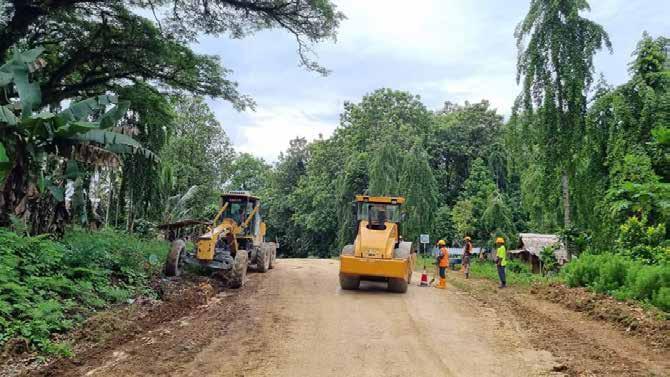
SIGNIFICANT PROGRESS IN MALAITA'S ROAD AND BRIDGE UPGRADES THROUGH SIRAP AND SIRAP2 PROJECTS
MALAITA IS WITNESSING NOTABLE advancements in infrastructure development, with the ongoing implementation of the Solomon Islands Roads and Aviation Project (SIRAP) and the Second Solomon Islands Roads and Aviation Project (SIRAP2). These initiatives, spearheaded by the Solomon Islands Government and supported by the World Bank, are playing a crucial role in enhancing the safety and resilience of Malaita's transport network.
The much-needed upgrades to three key bridges on Malaita's North Road – Koa, Bio 1, and Bio 2 – are currently in progress and are anticipated to be completed by first quarter of 2024. Reeves Envico, the appointed contractor, is utilizing innovative approaches, such as the InQuik bridge system, to replace Bio 1 and Bio 2 Bridges. This in-situ poured semi-modular reinforced concrete bridge system is making its debut in the Pacific region, offering rapid and efficient construction. Simultaneously, the Koa Bridge is undergoing replacement with a reinforced concrete bridge.
Furthermore, the maintenance and upgrading of 17 kilometers of Malaita's North Road, stretching from Gwanaru’u Junction to “Forcim Market”, are advancing successfully. Activities such as vegetation clearing, flushing, and pressure blasting of culverts and drainage channels have already been completed. The local firm Exodus Trade Development Limited has been contracted to undertake these works, with supervision provided by SMEC and their team based in Auki.
Ongoing upgrades to Koa Road in North Malaita under the SIRAP and SIRAP2 projects.
Stephen Maesiola, the Permanent Secretary for the Ministry of Infrastructure Development, expressed pride in the ongoing road rehabilitation and bridge projects. He highlighted the potential impact on facilitating easier access to health and education services, ensuring that Malaitans are better connected not only to businesses but also to each other. Maesiola expressed gratitude to the World Bank for its support in funding the bridge projects alongside the broader SIRAP and SIRAP2 initiatives.
SIRAP2 is not only focusing on bridges but is also contributing to multiple infrastructure improvements in Malaita. The construction of four new bridges (Kolofe1, Kolofe2, Su’u Harbor, and Bira Bridges), upgrades to Honiara Airport and Santa Cruz (Lata) Airfield, investments in air navigation systems in MakiraUlawa and Temotu Provinces, and support for regional airport maintenance are part of the comprehensive SIRAP2 program. These initiatives collectively aim to create a more robust and efficient transportation network in Malaita, fostering improved connectivity and accessibility. The positive impacts extend beyond immediate infrastructure benefits, encompassing enhanced access to essential services, increased economic opportunities, and strengthened regional development. As these projects continue to progress, they mark a significant step toward a more prosperous and interconnected future for Malaita.
www.pacifictenders.com < 20

Navigating Solomon Islands’ Infrastructure Evolution Pacific Tenders Editorial
Piece
IN THE dynamic landscape of infrastructure development, Solomon Islands stands at a crucial juncture. With the unveiling of the Solomon Islands National Infrastructure Investment Plan (SNIIP), the nation takes a significant stride forward in its journey towards robust economic and social development. Reflecting on past initiatives and embracing strategic partnerships, Solomon Islands charts its course for a future defined by connectivity, efficiency, and prosperity.
Solomon Islands Prime Minister Sogavare highlighted, the SNIIP represents the evolution of infrastructure planning catalyzed by the pioneering National Infrastructure Investment Plan of 2013. This transformative initiative underscored the pivotal role of economic infrastructure in nation-building. However, amidst its commendable objectives, the plan’s methodology faced challenges, necessitating a recalibration towards precision and coherence.
The integration of the NIIP scoring system into subsequent infrastructure frameworks, notably the National Transport Plan (NTP), heralds a significant stride towards streamlined prioritization. By fostering consistency and transparency, this harmonization lays the foundation for informed decision-making, fostering trust among stakeholders and enhancing the efficacy of resource allocation.
The inauguration of the National Transport Core Initiative heralds a new era of connectivity, promising to knit together Solomon Islands’ diverse landscape into a cohesive national network. Anchored by ambitious targets and pragmatic milestones, this initiative holds the potential to revolutionize sea and land transport, catalyzing economic growth and fostering
inclusivity across communities.
The alignment of the 2023 National Infrastructure Priority Pipeline with Solomon Islands’ broader developmental agenda reflects a strategic vision that transcends sectoral silos. By embracing social infrastructure alongside traditional pillars of development, Solomon Islands demonstrates a holistic approach to nationbuilding, ensuring that progress resonates across every stratum of society.
Solomon Islands’ endorsement of China’s Belt and Road Initiative represents a strategic masterstroke, unlocking avenues for investment and fostering healthy competition among donors. By leveraging this newfound partnership, Solomon Islands fortifies its position on the global stage, paving the way for sustainable infrastructure development fueled by diverse funding sources.
While the horizon brims with promise, Solomon Islands must remain vigilant in navigating the hurdles that accompany ambitious infrastructure agendas. Beyond financial constraints, the nation must address procurement challenges, cultivate expertise, and nurture human capital to ensure the seamless execution of projects. Moreover, a steadfast commitment to asset maintenance is imperative to forestall the costly cycle of neglect and reconstruction.
As Solomon Islands embarks on its infrastructure odyssey, guided by foresight and fortified by strategic partnerships, it stands poised to realize its full potential. Through prudent planning, diligent execution, and unwavering resolve, Solomon Islands charts a course towards a future where robust infrastructure serves as the bedrock of prosperity and progress for generations to come.
Solomon Islands’ endorsement of China’s Belt and Road Initiative represents a strategic masterstroke, unlocking avenues for investment and fostering healthy competition among donors.
INFRASTRUCTURE DEVELOPMENT / INDUSTRY > www.pacifictenders.com 21


CONSTRUCTION PROGRESSES ON SOLOMON ISLANDS' COMPREHENSIVE MEDICAL CENTER
CONSTRUCTION of the Comprehensive Medical Center at the National Referral Hospital (NRH) in the Solomon Islands, generously funded by the Peoples Republic of China (PRC), has been steadily advancing since its commencement on December 15, 2023. As the project enters its tenth week on March 4th, significant milestones have been achieved, including the completion of foundation and groundwork construction along with interior backfilling.
The primary objective of this comprehensive medical center is to fortify local initiatives in combating Non-Communicable Diseases (NCDs), which stand as the leading cause of mortality in the Solomon Islands. Spearheaded by Jiangsu Jiangdu Construction Solomon Ltd, the project management team, led by Ms. Zheng, remains committed to ensuring seamless progress amidst challenges, particularly during the rainy season. Ms. Zheng expressed confidence in meeting the anticipated completion timeline of sixteen months, emphasizing the team's dedication to delivering a state-of-the-art medical facility conducive to serving the needs of the Solomon Islands populace.
Meanwhile, Mrs. Pauline McNeil, the Health Permanent Secretary, expressed satisfaction with the project's advancement, foreseeing the imminent benefits it will bring to
the healthcare landscape. Anticipating the facility's specialized services, particularly in addressing complications related to NCDs such as cardiac and nephrology cases, Mrs. McNeil underscored the significance of combating these ailments, which remain the primary contributors to mortality in the region.
Completion of the Comprehensive Medical Center will not only enhance the scope and quality of medical services available to Solomon Islanders but also reduce the necessity for overseas referrals for NCD-related treatments. This milestone aligns with the overarching vision of achieving universal health coverage in the Solomon Islands, a testament to the collaborative efforts between the government and its development partners, notably the People's Republic of China.
Mrs. McNeil expressed heartfelt gratitude to the PRC for its unwavering support, not only in facilitating the construction of this vital healthcare infrastructure but also for its broader contributions to the health sector. As construction progresses, the anticipation grows for the inauguration of this transformative medical center, poised to significantly elevate healthcare accessibility and outcomes for the people of the Solomon Islands.
www.pacifictenders.com < 22
Foundation and groundwork construction along with interior backfilling at NHA.

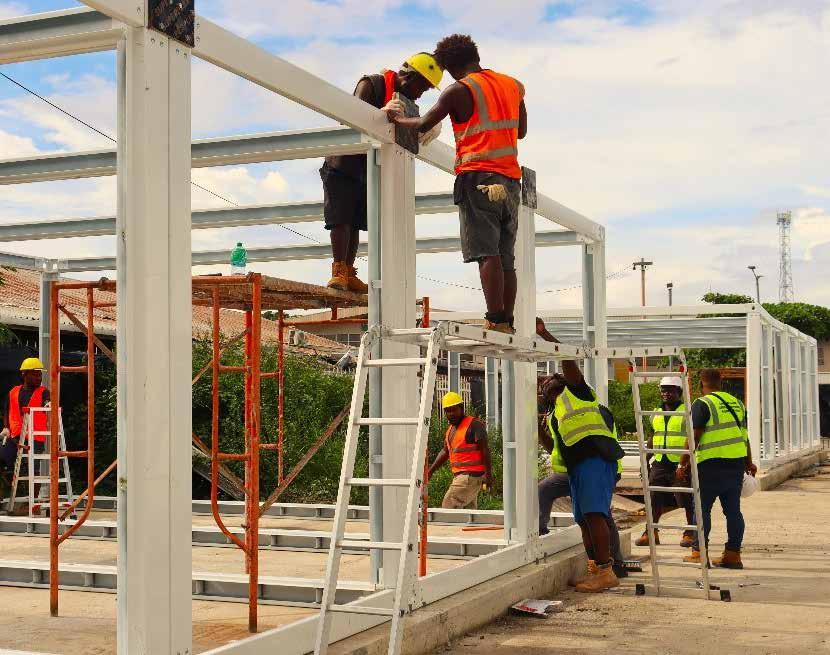
RENOVATION AND EXPANSION OF NATIONAL MEDICAL STORES ADVANCING STEADILY
CONSTRUCTION activities at the National Medical Stores in East Honiara, as part of the National Medical Store Renovation and Office Expansion Project, are advancing smoothly and according to schedule.
Funded by the World Bank's COVID-19 Emergency Response Project, the refurbishment is underway by local contractor Jed Enterprises. This initiative aims to mitigate the threat posed by COVID-19 while enhancing the infrastructure of critical facilities in the Solomon Islands. Despite the challenges posed by the pandemic, it has presented an opportunity for the Ministry of Health and Medical Services (MHMS) to invest in infrastructure improvements and expansions, particularly in key healthcare facilities.
The National Medical Store is a cornerstone of the healthcare system, responsible for procuring, storing, and distributing essential medicines and medical supplies to all Public Health Facilities nationwide. The ongoing refurbishment and expansion
endeavors will ensure proper storage and timely distribution of medicines and medical supplies to health clinics across the country.
The current phase of refurbishment involves the comprehensive repair of the entire National Pharmacy Building, alongside an extension to the existing structure and the addition of extra storage space adjacent to the building. Additionally, an administration block is slated for construction next to the existing facility.
Jonathan Bisili, the Infrastructure Officer of the Project Management Unit (PMU), reports that the project has entered its second phase of Extension Works and is progressing well within the designated timeline. Bisili notes, "The extension Project is currently in the Prefabricated Container Modular Installation stage, with finishing expected to follow. The contractor, JED Enterprise, is diligently assembling all prefabricated structures and components, working tirelessly to
> www.pacifictenders.com 23
PMU Technical Staf observing work being done on site by construction workers of Jed Enterprise.

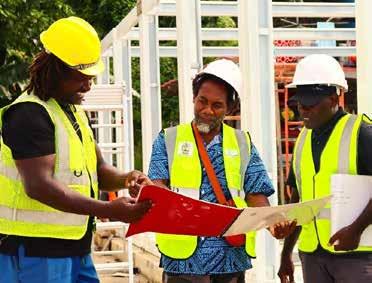
meet the target completion by the end of this month. Concurrently, refurbishments to the existing building are also underway, anticipated to be completed by June this year."
Project Manager Harry Kereseka affirms that this project marks the inaugural major infrastructure subproject under the health strengthening component of the World Bank's Project Management Unit. Kereseka adds, "Further projects in the pipeline include the construction of four clinical waste management incinerators, establishment of three isolation units, and renovation works at three healthcare facilities nationwide."
Acknowledging the pivotal role played by the Ministry of Finance and Treasury (MOFT) in negotiating with the World Bank for the COVID Emergency Funds during the height of the pandemic in 2021/2022, the Ministry of Health expresses gratitude for the support.
The National Medical Store refurbishment and extension project are anticipated to conclude by the end of May this year.
TULAGI HOSPITAL RENOVATION PROJECT BEGINS
RENOVATION efforts at Tulagi Hospital begins soared into action with a momentous groundbreaking ceremony held within the hospital compound. Presided over by the caretaker Minister for Health and Medical Services, Dr. Culwick Togamana, the caretaker Premier for Central Province, Mr. Polycarp Vakino Galaigu, and the esteemed Super Construction Director, Mr. Michael Leong, the event marked the commencement of an ambitious 8-month-long renovation project.
The comprehensive renovation initiative aims to enhance various key areas of the hospital, including the administration building, theatre, dental facilities, isolation unit, and the labor ward, among others. Upon completion, these improvements will enable the local community to access high-quality and specialized healthcare services directly at Tulagi Hospital, eliminating the need for arduous referrals to Honiara, a journey often fraught with risks for sick patients, especially those requiring urgent care.
Addressing the gathering at the inauguration, Dr. Togamana highlighted the significance of these renovations, emphasizing their role in fortifying the healthcare infrastructure amidst the challenges posed by the recent COVID-19 pandemic. He expressed gratitude to the World Bank for their support through the Health System Project (COVID-19 Emergency Response), acknowledging their instrumental role in strengthening healthcare systems and services across various facilities, including Tulagi Hospital.
"I extend my heartfelt appreciation to the World Bank team and the Ministry of Finance and Treasury for their unwavering
support during these trying times of the pandemic," remarked Dr. Togamana. He also extended his gratitude to the Project Management Unit Team for their diligent efforts in overseeing the project's implementation.
Echoing Dr. Togamana's sentiments, Premier Galaigu commended the collaborative efforts of all stakeholders involved in realizing this vital development for Tulagi. However, he emphasized that the journey towards comprehensive healthcare provision is ongoing, urging continued vigilance and innovation in addressing the evolving healthcare needs of the populace.
Ms. Annette Leith, representing the World Bank Country Manager, underscored the importance of partnerships in driving transformative change. She lauded the collaboration between the World Bank, local authorities, and other stakeholders, emphasizing its pivotal role in achieving sustainable development goals.
Further enriching the renovation project, Central Province will receive a new incinerator, alongside the provision of two outboard motors, delivered last year to enhance logistic services from rural clinics to the hospital. These additional resources underscore the commitment to bolstering healthcare infrastructure and services beyond the confines of Tulagi Hospital.
In closing, the groundbreaking ceremony heralded not just the physical transformation of Tulagi Hospital but also symbolized a collective commitment to advancing healthcare access and delivery, ensuring healthier and more resilient communities for generations to come.
www.pacifictenders.com < 24
PMU Technical Staff discussing the plan with the JED Enterprise site foreman.

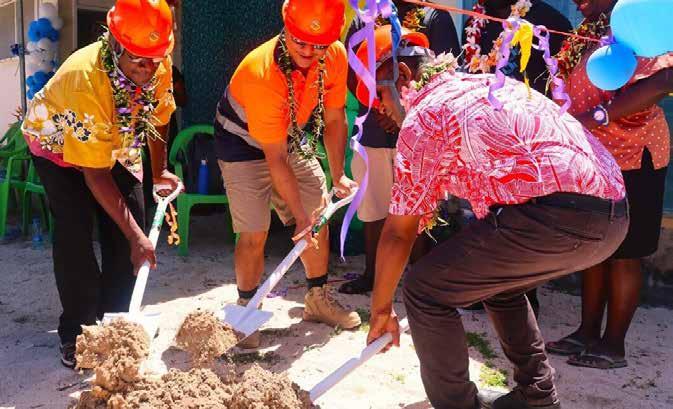
 The groundbreaking ceremony held within the hospital compound at Tulagi.
The groundbreaking ceremony held within the hospital compound at Tulagi.

MEET OUR MEMBERS
Company Name EXODUS TRADING
Country of Origin SOLOMON ISLANDS
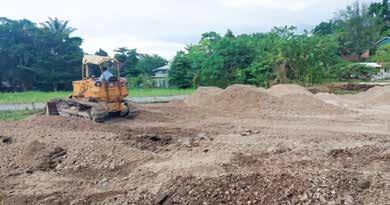
When did the Company start?
The Exodus TRADING was established in 1987.
What sectors or areas is the business focused on in its operations?
The company primarily focuses on timber milling and construction, including building and civil works.
What are some of the company’s milestone projects?
Mostly in Malaita Province since the addition of its subsidiary business establishement in civil works.
Some of the milestone projects undertaken by the company include:
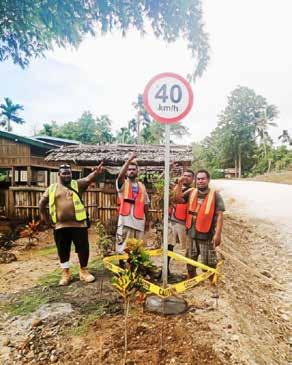
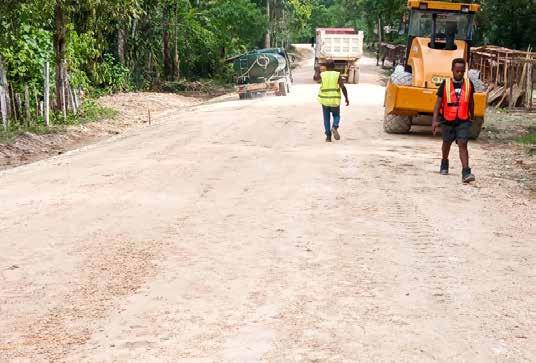
www.pacifictenders.com < JANUARY - MARCH / ISSUE 15 26
North Malaita roadworks.
l Suava Economic Growth Centre (EGC)
l Malu’u Fisheries Centre in Malaita Province
l Gwaigeo Taro Pack House in Malaita Province
l Magistrate Semi Court House
l North Road 17km re-gravelling from Dala to Focem market (Ferakui)-Malaita Province.
Where is the company’s base of operations?
The company is based in Honiara and Auki.
What are the expectations of the company for 2024?
The company aims to work in partnership with national and provincial governments to deliver on policy priorities. Additionally, they seek to engage local skilled labor in the productive construction industry and protect the domestic market for small-scale projects. They also plan to partner or subcontract with overseas companies for large contracts as part of their capacity-building efforts.
Why subscribe to Pacific Tenders?
The company subscribes to Pacific Tenders to network and connect with suppliers, stakeholders, and like-minded groups and individuals in order to enhance their business opportunities and collaborations.
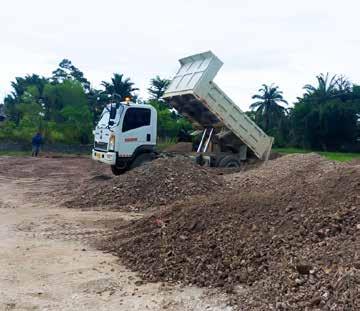
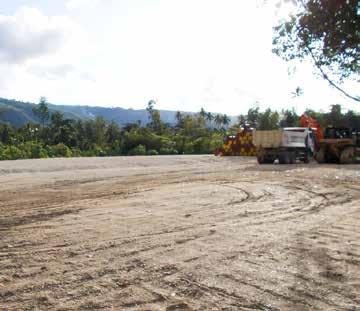
EXODUS TRADE DEVELOPMENT LTD
Papaho Heights Central Honiara
P. O Box 1731 Honiara
Phone: (677) 7736677
Email: jfonoota@gmail.com

INFRASTRUCTURE DEVELOPMENT / INDUSTRY > www.pacifictenders.com 27
Culvert at Dala North
Suava Economic Growth Centre (EGC)
Solomon Power area in Auki.
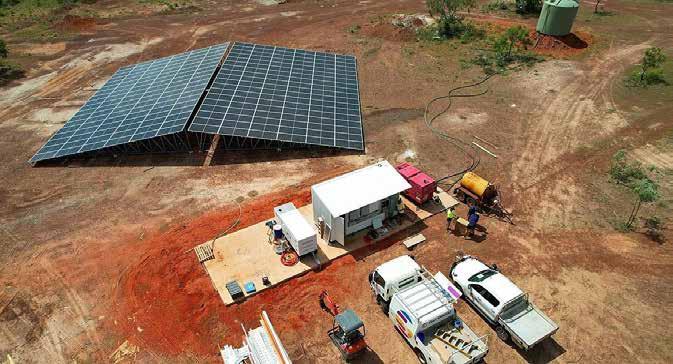
HGDC and GenOffGrid Forge Partnership to Advance Remote Solar Power Solutions
THE HIDES GAS DEVELOPMENT COMPANY LTD (HGDC) has recently inked a Memorandum of Understanding (MoU) with GenOffGrid, signaling a collaborative effort to bolster the deployment of remote solar power stations. This strategic alliance aims to foster the training and employment of tradesmen, engineers, and technical staff in both Papua New Guinea (PNG) and Australia, with a shared vision of accelerating the establishment of remote solar power infrastructure.
In a joint statement, the two companies underscored the significance of the agreement, emphasizing its potential to promptly cultivate local expertise within PNG through collaborative training initiatives and technology transfer programs. Central to this partnership is the imperative to address the escalating demand for energy infrastructure, buoyed by the influx of projects sponsored by foreign aid agencies. These endeavors align with the overarching goal of the Marape government to elevate PNG's electricity access from 15 percent to 70 percent by 2030.
John Davidson, the managing director of GenOffGrid, expressed his enthusiasm for the collaboration, affirming the company's commitment to leveraging its expertise in remote solar power station construction. He underscored the pivotal role of this partnership in expediting the development
of indigenous capacity to support PNG's ambitious electrification program.
GenOffGrid is poised to establish a logistical hub in Lae, complemented by administrative offices in Port Moresby. The company recently completed a solar project under a foreign aid program in a remote region of PNG, showcasing its operational capabilities in the local context.
Libe Parindali, Chairman of HGDC, commended GenOffGrid's technological prowess and track record, emphasizing the mutual benefit derived from their collaboration. He underscored the shared objective of empowering PNG nationals through skills development initiatives, thereby fostering long-term employment opportunities and contributing to the nation's energy resilience.
The partnership between HGDC and GenOffGrid signifies a concerted effort to address PNG's energy needs through sustainable, renewable solutions. By harnessing the collective expertise of both entities, the collaboration holds the promise of delivering tangible energy solutions to the PNG populace while fostering economic growth and social development in the region.
- PNG Business News
www.pacifictenders.com < JANUARY - MARCH / ISSUE 15 28
Tourism Industry Flourishes with $1.3 Billion Projects Underway
AT THE 2023 ANZ Fiji Excellence in Tourism Awards gala dinner, Deputy Prime Minister and Tourism Minister Viliame Gavoka shared exciting updates about the booming tourism sector, highlighting a series of $1.3 billion projects currently in progress. This celebration recognized the outstanding performance of various tourist operators in 2023, with notable winners including Malolo Island Resort, South Sea Cruises, and the VOU Dance Group.
Mr. Gavoka, while congratulating the winners, expressed enthusiasm for the promising year ahead and shed light on several upcoming projects. Among these developments is the recent opening of Waya Island Resort, which stemmed from the visionary idea of Noah, the principal owner’s father. Additionally, the Hari Punja Group of Companies announced a significant project involving a 258-room hotel in Wailoaloa.
Furthermore, Mr. Gavoka mentioned the imminent opening of the FIJI Water expansion, scheduled within the next two weeks, along with their venture into commercial agriculture. He also revealed plans for the construction of
two more six to seven-star properties starting in June, with further investments anticipated in the sector.
Despite the sweet taste of success experienced by the hospitality sector post-COVID, Mr. Gavoka urged operators to remain vigilant of the challenges ahead. He emphasized the importance of maintaining competitiveness as a business and as a destination, particularly in light of projected medium-term economic growth returning to pre-pandemic levels.
During the awards ceremony attended by 700 operators and stakeholders, Mr. Gavoka highlighted significant milestones achieved in the sector's journey towards sustainability and equity. Notably, he announced the impending launch of the Fiji Sustainable Tourism Framework in April, which will serve as a guiding beacon for sustainability efforts. This framework aims to ensure that tourism practices prioritize environmental responsibility, cultural sensitivity, and social equity, thereby fostering a more sustainable and inclusive tourism industry.
- Fiji Times
USTDA Announces New Funding for Pacific Islands Infrastructure Development
THE U.S. TRADE and Development Agency (USTDA) announced new funding to strengthen public procurement of quality infrastructure in seven Pacific Island countries. Specifically, USTDA will fund training under its Global Procurement Initiative (GPI) on best practices, models and analysis tools for governments to obtain the best value for their money. Director Enoh T. Ebong made the announcement in Fiji on the second anniversary of the U.S. government’s Indo-Pacific Strategy launch.
“Strong, transparent public procurement systems allow countries to evaluate proposals based on long-term lifecycle costs and best value, rather than relying on lowestcost bids that can result in poor-quality infrastructure and failed development outcomes,” said Director Ebong. “Our training is intended to generate the best possible outcomes for our Pacific Island partners. This includes best value for their tax dollars and greater competition for their infrastructure procurements from a wider range of international companies, including those from the United
States.”
USTDA’s assistance will include in-country training and a study tour to the United States. The three-day training workshop, to be held in Fiji, will convene mid- to seniorlevel procurement officials from Fiji, Kiribati, Papua New Guinea, Solomon Islands, Tonga, Tuvalu, and Vanuatu. The study tour will bring up to 17 Pacific Islands procurement officials from these countries to the United States to learn about effective procurement models through engagement with counterparts at the U.S. federal, state, and local levels.
This activity advances the Partnership for Global Infrastructure and Investment to deliver game-changing projects to close the infrastructure gap in developing countries. It also supports the Pacific Quality Infrastructure Principles agreed to by 18 Pacific countries and territories at the November 2023 Pacific Islands Forum (PIF) Leaders’ Meeting.
- USTDA
INFRASTRUCTURE DEVELOPMENT / INDUSTRY > www.pacifictenders.com 29

















 By DAVID SPRING PT COLUMNIST Sydney, Australia
By DAVID SPRING PT COLUMNIST Sydney, Australia




 By LORNA BONDOC PT Marketing and Research Consultant Manila, Philippines
By LORNA BONDOC PT Marketing and Research Consultant Manila, Philippines














 The groundbreaking ceremony held within the hospital compound at Tulagi.
The groundbreaking ceremony held within the hospital compound at Tulagi.









